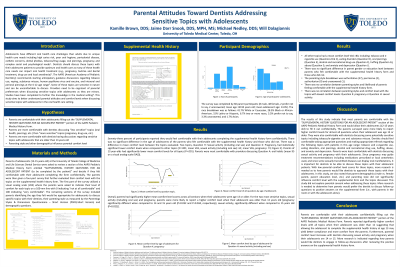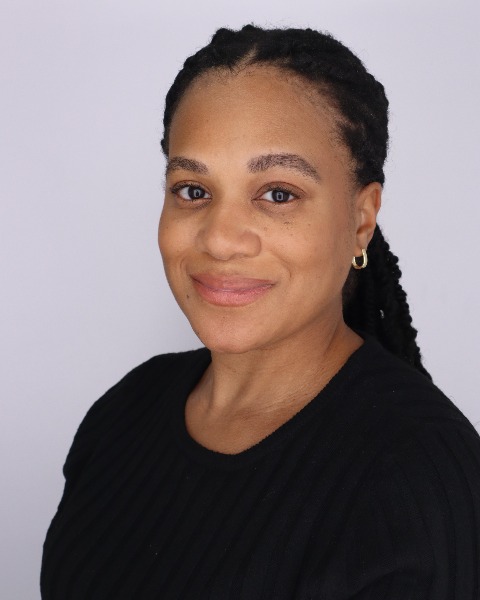Patient Management
234 - Parental Attitudes Toward Dentists Addressing Sensitive Topics with Adolescents


Kamille L. Brown, DDS (she/her/hers)
Pediatric Dentistry Resident
The University of Toledo Medical Center
The University of Toledo Medical Center
Grosse Pointe Farms, Michigan, United States- JS
Jaime Snook, DDS, MPH, MS
The University of Toledo Medical Center
- WD
Will Dalagiannis, N/A
Ohio State University
- MN
Michael P. Nedley, D.D.S
Program Director
The University of Toledo Medical Center
Toledo, Ohio, United States
Presenting Author(s)
Co-Author(s)
Program Director(s)
Purpose: The aim of this study was to evaluate parental comfort levels with dentists discussing sensitive topics with adolescents in the oral health care setting.
Methods: Parents of adolescent patients (12-15 years old) were asked to review the “SUPPLEMENTAL HISTORY QUESTIONS FOR AN ADOLESCENT PATIENT (to be completed by the patient)” section of the AAPD Pediatric Medical History Form and indicate their comfort with their adolescent completing the form confidentially. Afterwards, participants completed a four-part survey that assessed their comfort level with the topics reviewed in the supplemental section, the age they felt would be appropriate for adolescents to discuss these topics with their dentists, their parenting style, and demographic questions.
Results: Sixty parents were surveyed with 73% of participants reporting they would feel comfortable with their adolescent completing the supplemental section. Parents of 12-year-olds had significantly lower mean comfort levels for all topics (P < .001). Parents were most comfortable with providers discussing oral habits [mean 95 on a visual analog scale (VAS)]. Two topics, sexual activity (including oral sex) and pregnancy, had statistically significant lower comfort levels when compared to other topics [P < .001; mean VAS, sexual activity (including oral sex): 62; mean VAS, pregnancy: 74].
Conclusions: Most parents are comfortable with their adolescents completing the supplemental history questions confidentially. Parents reported significantly higher comfort levels with all topics when their adolescent was older than 12, suggesting that allowing the adolescent to complete the supplemental health history at age 13 may yield better compliance and more comfort from parents.
Identify Supporting Agency and Grant Number:

.jpg)